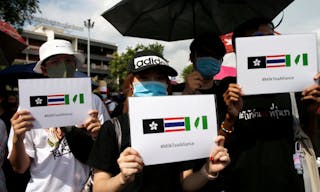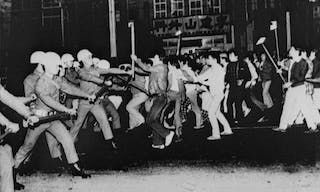What you need to know
While Taiwan may be an example of successful democratization, the authoritarianism that its people experienced decades ago is on the rise today.
By Jenny Wang
The world has been struggling for human rights, freedom, and democracy for decades, but today, 4.2 billion people still live under authoritarian rule. On Human Rights Day, which takes place on December 10, it is time that we re-commit ourselves to upholding the rights and freedoms enshrined in the Universal Declaration of Human Rights.
On this day in 1979, thousands gathered in Kaohsiung, Taiwan to commemorate Human Rights Day and demand democracy. Participants were grassroots activists, journalists, students, teachers, lawyers, and even foreigners. But what started as a peaceful demonstration turned violent when riot police, ordered by the Kuomintang (KMT) government, deployed tear gas. On the next day, KMT authorities arrested and imprisoned almost all the prominent pro-democracy activists.
Taiwan had already been under the authoritarian KMT regime for three decades at the time, and the political environment was increasingly suffocating. Freedom of speech and expression was heavily suppressed. Anyone who dared to speak ill of the dictatorship were “disappeared” and subject to arbitrary detention, torture, and sometimes execution.
With only government-approved messages and propaganda circulating in mainstream media, pro-democracy activists started underground independent publications to get their voices heard. But those who were caught reading, writing, or distributing these publications were often either jailed or killed. It was the backdrop against which Taiwanese people, frustrated by years of oppression and fear, were mobilized to the streets 41 years ago.
The event, known as the Kaohsiung Incident, played a pivotal role in Taiwan’s transition from authoritarianism to democracy. Today, the country champions human rights, upholds freedoms, and is a role model for emerging democracies around the world.

Photo Credit: Reuters / TPG Images
While Taiwan may be an example of successful democratization, the authoritarianism that its people experienced decades ago is on the rise today.
According to an analysis by the Human Rights Foundation on political regimes, 4.2 billion people in 95 countries currently live under authoritarian rule. In other words, democracy and fundamental freedoms — such as freedoms of speech, expression, assembly, and religion — are denied to more than half of the world’s population. To make matters worse, authoritarian leaders have been taking the Covid-19 pandemic as an excuse to tighten controls.
When Covid-19 first emerged in China, the Chinese government revved up its propaganda machine and swiftly silenced whistleblowers, such as Dr. Li Wenliang, and grassroots citizen journalists, such as Chen Qiushi, for sharing information at odds with the government’s narrative.
Meanwhile, in Russia and Cuba, lawmakers enforced vague mandates under the guise of preventing disinformation, when in reality, these laws allowed the regimes to further censor the media and opposition and concerned civil society organizations.
While the world was distracted by the pandemic, China also consolidated its power within Hong Kong and imposed a draconian national security law in July 2020, bypassing the Hong Kong government’s formerly independent legislative and judicial procedures. A few weeks later, Belarusian authorities violently clamped down on peaceful pro-democracy protests against the 26-year president Alexander Lukashenko’s re-election in early August.
Yet despite the alarming rise of authoritarianism during Covid-19, there is still hope.

Photo Credit:Reuters / TPG Images
Despite a difference in demands among pro-democracy protests around the world, there is an underlying thread that ties them all together: the desire for human rights, freedoms, and democracy. Driven by this common thread, protesters have supported each other and sought inspiration from one another.
Activists in Belarus looked to those in Hong Kong on how to better communicate and effectively organize using encrypted messaging apps such as Telegram. To show regional solidarity, activists and netizens in Thailand, Hong Kong, and Taiwan have formed the “Milk Tea Alliance” to advance democracy in Asia using social media and creative dissent.
This Human Rights Day, the world must re-commit themselves to upholding the rights and freedoms enshrined in the Universal Declaration of Human Rights. The task should not fall only on the shoulders of politicians and policymakers. It must also be shared by all of us living in democracies, where we are free to lend our voices to those silenced in their countries. Businesses and corporations, especially the ones born out of democracies where ideas and personal freedoms prosper, must incorporate human rights due diligence policies into their practices to ensure that they are not abetting an authoritarian regime.
Celebrities and athletes must not fall for the alluring traps of dictators’ elaborate whitewashing schemes. Consumers must urge their favorite brands to always prioritize the dignity of people over profits. Concerned global citizens must actively engage and brainstorm with one another on how to create and foster an international support system to stand up against the global rise of authoritarianism.
The journey towards human rights, freedoms, and democracy is long and trying. Turning the tide towards a freer and more just world is not an unattainable goal, but it will take the efforts of each and every one of us. As we have seen from Taiwan’s journey, overcoming authoritarianism is not impossible after all.
Jenny Wang is a strategic advisor at the Human Rights Foundation (HRF).
The Oslo Freedom Forum is Human Rights Foundation’s flagship annual conference series dedicated to putting human rights at the top of the global agenda. Since 2018, the Human Rights Foundation has hosted the Asia-based Oslo Freedom Forum in Taiwan. Taiwan’s journey from authoritarianism to democracy continues to inspire our community — among them individuals who have been personally targeted by authoritarian governments — to become more involved in the struggle to advance fundamental freedoms, and to determine how to tackle ongoing human rights abuses. Due to the COVID-19 pandemic, the third Oslo Freedom Forum in Taiwan has been postponed from 2020 to 2021.
READ NEXT: Why Hong Kong Should Keep Defending Its Democracy
TNL Editor: Bryan Chou (@thenewslensintl)
If you enjoyed this article and want to receive more story updates in your news feed, please be sure to follow our Facebook.



